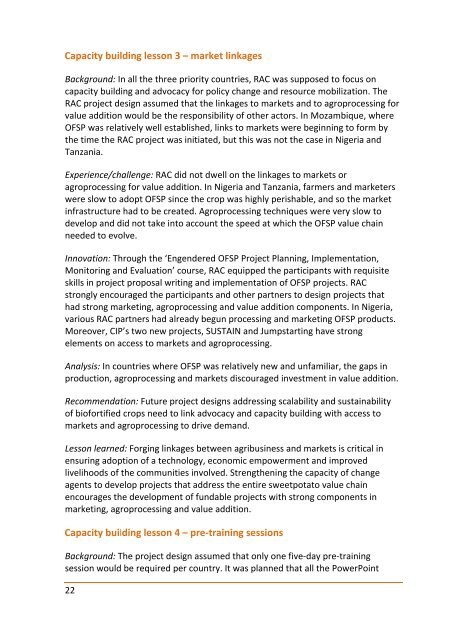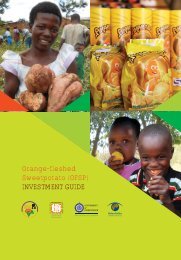Recommendation
Up89Y
Up89Y
You also want an ePaper? Increase the reach of your titles
YUMPU automatically turns print PDFs into web optimized ePapers that Google loves.
Capacity building lesson 3 – market linkages<br />
Background: In all the three priority countries, RAC was supposed to focus on<br />
capacity building and advocacy for policy change and resource mobilization. The<br />
RAC project design assumed that the linkages to markets and to agroprocessing for<br />
value addition would be the responsibility of other actors. In Mozambique, where<br />
OFSP was relatively well established, links to markets were beginning to form by<br />
the time the RAC project was initiated, but this was not the case in Nigeria and<br />
Tanzania.<br />
Experience/challenge: RAC did not dwell on the linkages to markets or<br />
agroprocessing for value addition. In Nigeria and Tanzania, farmers and marketers<br />
were slow to adopt OFSP since the crop was highly perishable, and so the market<br />
infrastructure had to be created. Agroprocessing techniques were very slow to<br />
develop and did not take into account the speed at which the OFSP value chain<br />
needed to evolve.<br />
Innovation: Through the ‘Engendered OFSP Project Planning, Implementation,<br />
Monitoring and Evaluation’ course, RAC equipped the participants with requisite<br />
skills in project proposal writing and implementation of OFSP projects. RAC<br />
strongly encouraged the participants and other partners to design projects that<br />
had strong marketing, agroprocessing and value addition components. In Nigeria,<br />
various RAC partners had already begun processing and marketing OFSP products.<br />
Moreover, CIP’s two new projects, SUSTAIN and Jumpstarting have strong<br />
elements on access to markets and agroprocessing.<br />
Analysis: In countries where OFSP was relatively new and unfamiliar, the gaps in<br />
production, agroprocessing and markets discouraged investment in value addition.<br />
<strong>Recommendation</strong>: Future project designs addressing scalability and sustainability<br />
of biofortified crops need to link advocacy and capacity building with access to<br />
markets and agroprocessing to drive demand.<br />
Lesson learned: Forging linkages between agribusiness and markets is critical in<br />
ensuring adoption of a technology, economic empowerment and improved<br />
livelihoods of the communities involved. Strengthening the capacity of change<br />
agents to develop projects that address the entire sweetpotato value chain<br />
encourages the development of fundable projects with strong components in<br />
marketing, agroprocessing and value addition.<br />
Capacity building lesson 4 – pre‐training sessions<br />
Background: The project design assumed that only one five‐day pre‐training<br />
session would be required per country. It was planned that all the PowerPoint<br />
22



